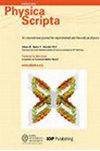研究 CeO2 支持的金簇的几何构型和电子特性
IF 2.6
3区 物理与天体物理
Q2 PHYSICS, MULTIDISCIPLINARY
引用次数: 0
摘要
详细了解铈表面金纳米粒子的几何结构和电子特性对于理解其独特的催化活性至关重要。利用基于密度泛函理论的第一原理方法,研究了 Aux(x = 1-4)团簇在 CeO2(111)表面的吸附。研究发现,Au2 和 Au3 的站立构型以及 Au4 的四面体结构是最稳定的吸附结构。这些构型的稳定性是由 Au-Au 键的数量和强度、Au-O 键能以及团簇与基底之间的相互作用动力学共同决定的。对 Bader 电荷、差电荷密度和态密度的分析表明,还原 Ce3+ 中存在晶格弛豫和电子局域化。Ce3+ 的还原量和位置受 Aux 簇的位置和电荷转移量的显著影响。CO 在 Au4/CeO2(111)上的吸附表明,由于 Au-5d 和 C-2p 的杂化,Au-C 键的能量更强,从而提高了 CO 氧化反应的催化活性。本文章由计算机程序翻译,如有差异,请以英文原文为准。
Investigation into geometric configurations and electronic properties of CeO2-supported gold clusters
A detailed understanding of the geometric structure and electronic properties of gold nanoparticles on the ceria surface is crucial for comprehending their unique catalytic activity. Using the first-principles method based on density functional theory, the adsorption of Aux (x = 1–4) clusters on the CeO2(111) surface was studied. It was discovered that the standing configurations of Au2 and Au3, as well as the tetrahedral structure of Au4, are the most stable adsorption structures. The stability of these configurations is jointly determined by the number and strength of Au-Au bonds, the Au-O bonding energy, and the interaction dynamics between the clusters and the substrate. The analysis of Bader charge, difference charge density and density of states suggested that lattice relaxation and electronic localization occur in the reduced Ce3+. The reduced amount and location of Ce3+ are significantly influenced by the position and charge transfer amount of Aux cluster. The adsorption of CO on Au4/CeO2(111) indicated that stronger Au-C bonding energy due to the hybridization of Au-5d and C-2p, thereby enhancing the catalytic activity for CO oxidation reactions.
求助全文
通过发布文献求助,成功后即可免费获取论文全文。
去求助
来源期刊

Physica Scripta
物理-物理:综合
CiteScore
3.70
自引率
3.40%
发文量
782
审稿时长
4.5 months
期刊介绍:
Physica Scripta is an international journal for original research in any branch of experimental and theoretical physics. Articles will be considered in any of the following topics, and interdisciplinary topics involving physics are also welcomed:
-Atomic, molecular and optical physics-
Plasma physics-
Condensed matter physics-
Mathematical physics-
Astrophysics-
High energy physics-
Nuclear physics-
Nonlinear physics.
The journal aims to increase the visibility and accessibility of research to the wider physical sciences community. Articles on topics of broad interest are encouraged and submissions in more specialist fields should endeavour to include reference to the wider context of their research in the introduction.
 求助内容:
求助内容: 应助结果提醒方式:
应助结果提醒方式:


